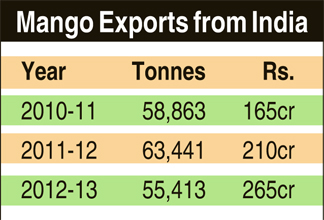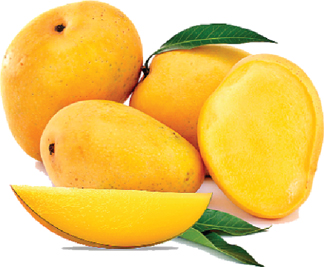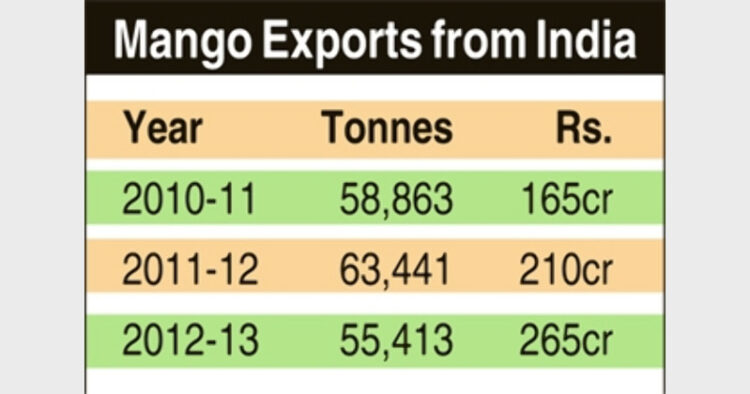The European Union”s (EU) decision, to ban the import of Indian mangoes and four other vegetables from May 1 onwards alleging that some consignments of mangoes last year had been infested from a non-European fruit fly aims to arm twist the weak UPA regime in the ongoing negotiations on the Free Trade Agreement (FTA) and other bilateral trade issues. Otherwise, the Europe has been importing these products for centuries and none of these have been infested afresh, from any new pests in these years. The European Union has singled out India alone, while, there are other countries in Africa and Asia, where cultivation and packaging processes are far worse than India.
It is all the more strange that the government could not get reversed such a partisan and discriminatory ban in 5 weeks that lapsed between March 26 and May 1, when the ban has become effective. It is inspite of the fact that, Indian and European Union officials concerned with the phyto-sanitary issues have already met and hammered out a new system for handling shipments of mangoes headed for Europe, wherein all our exports of vegetables and mangoes are already subjected through “pack houses” since April 1, to comply with the European phyto-sanitary measures and ensure that they are free from any objectionable pest or disease. For this purpose, India had already established world class laboratories through the Agriculture and Processed Food Products Export Development Authority (APEDA), whose certification processes are in conformity with the Euro-American standards and are well acceptable in Europe and the US. Due to failure of our trade diplomacy, this contemptuous blow is targeted deliberately towards India, just to extort greater leeway in securing more liberal market access in the ongoing negotiations on the FTA and other bilateral issues.
SC Verdict: A setback to Right to Education Act?
The Agreement on Sanitary and Phytosanitary Measures (the SPS Agreement), the entered into force with the establishment of the World Trade Organization (WTO) on January 1, 1995, enables governments to set out basic rules for food safety and animal and plant health standards. But, these should be based on scientific evidence. There is no evidence till date that the fruit fly found last year, can cause any harm to human health. Health the EU”s ban is illegal. So, India must drag EU to the Dispute Settlement Body of the WTO.

It is all the more deplorable on the part of the Government of India that the EU had raised serious concerns on the import of mangoes and vegetables as early as in April last, but, the government neither put the pack-houses in place till April 2014, nor took up the matter in time with the EU. The callousness of the government as well as of the APEDA in the matters of agri-exports is explicitly reflected with respect to export of mangoes to Japan as well. Japan had lifted the ban on import of mangoes from India in 2006, which was imposed in 1986. It has even exempted inspection of the mangoes for chloripyriphos- a pesticidal chemical as well. In the protocol signed with India, Japan has required only “Vapour Heat Treatment (VHT) of several mango varieties like Alphonso, Kesar, Langra, Chausa and Malika. But, no meaningful initiative has been taken to resume exports to Japan except that only 67 tonnes of mangoes were exported to Japan in 2011-12 and nil in 2012-13.
Winds of Change in Gilgit-Baltistan
India is the world”s largest exporter of mangoes, which exports around 60,000 tonnes of it (vide table 1) out of a total production of 17-18 million tonnes. India exported 55,413 metric tonnes of mangoes to 51 countries, of which the exports to the 28-member EU was just 3890 tonnes in 2012-13. So volume of exports vis-à-vis total production of mangoes is just 0.4 pe cent of the mango crop. But, the panel action of a ban is contemptuous against our country”s trading image, especially when all the issues of infestation have been addressed in conformity with the benchmarks of the EU.
EU has been arm twisting the Indian government with respect to other agri-processed products as well. Earlier on a similar pretext of the sanitary and phyto-sanitary measures, Indian squashes, pickles and jams were rejected by alleging that the labels of their containers are printed from inks, which were carcinogenic (cancer causing inks). The question is that who was going to lick the labels? Even in that case also, as is customary, the labels were laminated by thin polythene sheet.

So, this time India should have taken up this matter sternly to forbid EU from blackmailing India just for securing greater leeway in other trade issues by putting India on the back foot on the issue of fruits and vegetables exports. India and EU are strong trading partners and the trade relations had to be set on the premise of trust and understanding. Therefore, failure of the UPA regime to invoke the kind of faith and respect, India deserves, even after putting up the requisite phyto-sanitary safeguards is reflective of diplomatic failure, which had been explicitly visible all through the UPA regime. This is test case and India should retaliate with matching technical barriers to imports from EU, besides dragging them into the dispute settlement body of the EU.
The EU”s ban is bursting the traders as well as consumers of Indian mangoes in the EU. Therefore, the ban is being criticized in Europe as well. Even the Indo-EU chamber in Brussels has also objected. The issue has invoked lot of heat in UK, where it is slated to be discussed in the British House of Commons. The speaker has granted a parliamentary debate on the EU ban, on Thursday, the May 8 at 6 p.m. (10.30 p.m. Indian standard time) at the call of the NRI labour MP Keith Vaz.
Bhagwati Prakash, (The writter is pro Vice-Chancellor of Pacific Academy of Higher Education and Research University, Udaipur, Rajasthan)??













Comments